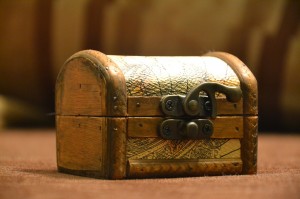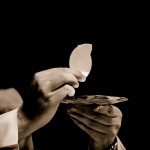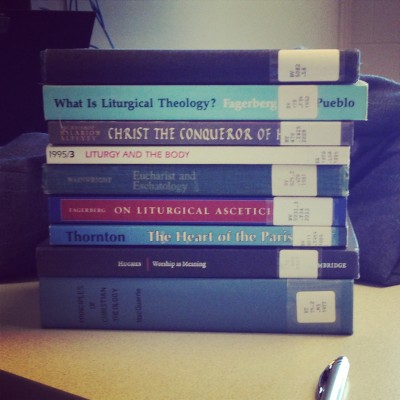(This is a copy of the sermon I preached yesterday on the 24th Sunday after Pentecost. It does not align fully with what was actually preached–I went off the ranch at times–but it I offer it here nonetheless for your reading and (hopefully) enrichment).
O God, whose blessed Son came into the world that he might destroy the works of the devil and make us children of God and heirs of eternal life: Grant that, having this hope, we may purify ourselves as he is pure; that, when he comes again with power and great glory, we may be made like him in his eternal and glorious kingdom; where he lives and reigns with you and the Holy Spirit, one God, for ever and ever. Amen.
A man lived in France during the pre-revolutionary and revolutionary periods of the early 1800’s. This man was in dire need one day: his sister’s child had no food to eat, as they were poor, and so he broke a window and stole a loaf of bread. Jean Valjean paid for this crime by serving on the chain gang for a long 19 years. Once his sentence had been fulfilled he re-entered the world with a chip on his shoulder and a score to settle: the world owed him greatly for the hell he had been put through, all for a loaf of bread. Things get worse before the get better as he robs a Bishop of all his silver while enjoying a meal and place to sleep one night. When the gendarmes bring Valjean back to the Bishop he is met with a kindness: the Bishop claims the silver was a gift and then tells Valjean:
But remember this, my brother
See in this some higher plan
You must use this precious silver
To become an honest man
By the witness of the martyrs
By the Passion and the Blood
God has raised you out of darkness
I have bought your soul for God! (from the musical, Les Miserables, and copied from memory)
Valjean goes on to do just that. He becomes the Mayor of a small town and cares for the people, he raises the orphaned daughter of a dead prostitute, and he shows grace and mercy to Inspector Javert, the man who has chased him for years and years. Though he certainly was not perfect, Valjean made good on the words of the Bishop all those years before. He had been presented with a choice: you have been redeemed, now live like it or don’t.
Friends, that very choice is before us today as well: you have been raised out of darkness by our great God and you most elect, daily, to live like it or not.
The choice is utterly yours but I have a strong suspicion that the Lord cares what you choose. But once that important choice is made your met with another dilemma: but how do I live? The lessons for this twenty-fourth Sunday after Pentecost are filled with hope, the call to purity, and pictures of sacrificial living. Our collect and lessons call us to such living; to hope, purity, and sacrifice.
Ordinary time is drawing to a close. Before you know it we’ll be putting away the green vestments from the season after Pentecost and exchanging them for the expectant purple of Advent. In three short weeks we’ll celebrate the New Year—according to the Church’s calendar—and we’ll be well on our way journeying through the incarnation and epiphany of Jesus. I say all of this because it should help us pay particular attention to the lessons over the next few weeks. These next weeks are like the slow and steady swelling of the orchestra before the chorus rings out again—we have been building to this point for months and will finally see the climax with Christ the King Sunday.
I’m getting ahead of myself, let’s us dig through the lessons together and I think you’ll see exactly what I’m talking about.
In 1 Kings we encounter the prophet Elijah. YHWH is instructing his prophet and the instructions are clear: “go to Zarephath. There is a widow there and she will feed you.” That’s it. Wouldn’t it be wonderful if the Lord’s instructions were clearer some times? I know it would bless me! But that’s not what Elijah was told and yet he traveled anyway.
To be a widow in this time was to be an outcast. We have a come along way since that time in caring for the needy, but in this period it would have certainly been a sentence to poverty and loneliness.
And yet YHWH, the God of Abraham, Isaac, and Jacob, the God of Israel, sent his prophet to a lowly and lonely widow. She is aware of her lot as well; she humble refuses the prophet’s request for food because she only has a little and that which she does have is for her son and her that they may eat it and die.
Elijah’s next request seems a bit jarring, and even insensitive based on the widow’s revelation: he wants to have the first piece of food and then only after that is she to eat with her son. But there is something else at work her. In God’s economy the last become first, the poor are actually rich, and that which is dead is brought to new life.
This is the same thing we see with the widow’s mite in Mark’s gospel lesson today as well. I’ll cover a different aspect of this story later because right now I want to point out the sacrifices made by these two women. They had nothing, or very little, and yet they gave and gave abundantly. Such generosity, such worship can only be based on divinely-inspired trust and hope. They both gave unto the Lord—one through his prophet and the other through the coffer—because in God’s kingdom those who have nothing really have everything. Praise be to God.
The best part about the story from 1 Kings is the rich blessing heaped upon the woman for her faithfulness. She and her family ate for days and the jar of meal and jug of oil were not emptied. The author of 1 Kings claims that this miracle was based on the word of YHWH, that is He spoke it into being and promised its fulfillment.
The psalmist offers majestic praise to YHWH based on his numerous and mighty works in, with, for, and on behalf of his people. The proper response to such deeds is worship. In this psalm we are told that the LORD cares for the righteous, the strangers, the widows, and the orphans. He cares for the hungry with food, the oppressed with justice, the blind with sight, the bowed down by lifting them up, and the prisoners with freedom.
Friends, you can find yourselves in this Psalm. In fact, I’d encourage you to place yourself squarely within this Psalm and join the cosmic praise that resounds because we serve the King of kings and Lord of lords.
I bet you were all hoping I’d skip over the first part of the Mark’s passage…or maybe I was hoping I could just avoid it! I cannot tell you how many times I have picked a seat at a table or in a group in order to highlight my awesomeness (note the sarcasm). I’m just shooting you straight. I squirm when I hear Jesus’ words here because I know that I am guilty of all of them. But let’s dig in for a moment and see what he has to say…
Jesus is speaking about the religious leaders of the day who were more concerned with their status and celebrity instead of doing what the LORD had called them to do. This is very mild compared to what he has to say in Matthew’s gospel when he calls them a brood of vipers, white washed tombs, and more. The best place to reference these remarks is in Ezekiel 34 when YHWH describes the work for which he set apart the religious leaders and the abject failure with which the job was met.
YHWH called them to bind up the injured, heal the sick, strengthen the weak, bring back the strays, and search for the lost. Instead they were feeding off of the flock, using the money coming in for their own purposes, padding their bank accounts as it were, and not distributing the finances and resources to those in need. YHWH said that he would be the shepherd of his people, Israel. This is the role we see Jesus in throughout the gospels. He is the shepherd and the religious leaders are no different than in the time of Ezekiel: they are about pomp and circumstance and visibility rather than healthy pastoral and spiritual leadership.
They walk into rooms and want to be recognized, they say long prayers to impress others, etc. Notice what is really at issue here. Jesus is not taking issue with prayer, or garments, or banquets. Rather, he is making severe statements about the human heart. The hearts of these leaders were far from God, they were more focused on the self, and that is the true issue. What is it that your heart desires? Prayer doesn’t have to be short or long in order to be considered “good,” rather it has to be from a true, sincere, and contrite heart.
I hear Jesus’ asking us through this passage today: how is your heart? What is it that you desire? For it is from the overflow of the heart that the mouth speaks and the body acts.
“SO WHAT?”
There’s something rather important from the Collect—and all the lessons—that I really want you to see. Notice who “moves first” in the prayer. The widow in 1 Kings is first told to not be afraid and that the LORD would fulfill his promise. Then she acts. Those recounted in Psalm 146 offer praise after the LORD has acted on their behalf and has delivered them from their various needs and afflictions. We may be called to have hope, etc. but it is only made possible through the person and work of Jesus. It is Jesus who destroys the work of the devil. It is Jesus who makes us God’s children. It is Jesus who makes us heirs of his kingdom. And then, only then, are we invited to live accordingly. Valjean was first, no he first had to be, shown kindness by the Bishop before the exhortation into living a better way could be heard and acknowledged.
“Having this hope”
No matter how you cut it we are a people of hope. As Christians, as followers of the Almighty God and his covenant family members, we have hope that he is who he says he is, that he will fulfill all he has promised, and that we look forward to the “resurrection of the dead and life everlasting.” Keep in mind that hope is different than faith. I would suggest that faith can—and perhaps should—waver from time to time but hope should spring eternal because the love and compassion of our trustworthy God is eternal.
The hope toward which we are directed is ultimately based on Jesus and not on ourselves. Hope needs an object. To have hope pure and simple is impossible. Hope does not take place in a vacuum. We must have hope in something.
“We may purify ourselves…as he is pure”
We are urged to be pure because Jesus is pure. How does one become pure? The only true way to become pure is to be purified by Christ through baptism. That being said, baptism takes place once in a specific place and at a specific time but it is a lifetime sacrament. In the church we have a myriad of tools and practices that are baptismal in nature and remind us of our baptismal covenant and cleansing. Jesus points to some of these as he speaks against the Pharisees in Mark 13. Please see this: Jesus wasn’t condemning prayer or fasting but the abuse of such practices for personal gain and arrogance. Again, it was about the condition of the human heart.
I’d like to suggest to you today that there are things we can do by the power of the Holy Spirit to purify ourselves daily. Please hear: this is not about earning salvation or purity. Nothing we can ever say or do will merit that in the least. This is joining in with the Holy Spirit to follow Jesus.
Daily prayer, confession, Eucharist, and the study of Scripture are all ancient practices that remind us of our baptismal covenant and that spur us on toward holy living and good works. I have a strong feeling that if we were to become a people of prayer, confession, Eucharist, and Scripture that we would in turn be purified and renewed daily through the Holy Spirit.
“We may be made like him”
Mysteriously in God’s economy the gift of humility sacrifice can be transformed into something far greater. The oil and meal of the widow feeds her family for days; the water at Cana becomes wine; the loaves and fishes become a feast for 5,000 with baskets filled with leftovers. I’m no accountant, and what I’m about to say would break every accounting rule, but in God’s Kingdom our gifts are radically expanded and exponentially increased because the one to whom we give is gracious, plenteous, and abounds in love.
What’s more, in our Great High Priest we have the most perfect and holy example of sacrificial giving. I’ve intentionally refrained from covering the Hebrews passage until now because it is so powerful, so glorious, and so awe-ful. Don’t think that you have to give in the 6-figures in order for God to pay attention to you. Look at the widow from Mark’s Gospel: she had nothing and gave next to nothing and yet Jesus saw her, as did the Father. Her gift did not go unnoticed even then though she would have been overlooked by everyone else in Jewish society—passed over, neglected, and ignored because of her status. The Creator and Ruler of the whole universe loves and cares for even the most lowly—according to human standards—among us. We worship through our giving because we know that who to whom we give is worthy of all majesty, honor and praise.
Friends, we are called to be a people who hope in the works of Jesus, who make themselves pure through prayer and spiritual practices, and who give of themselves as Christ has given. We cannot do this apart from the love of the Father, the sacrifice of the Son, and the power of the Holy Spirit working within us. To become such a people is to respond to God’s mercy and forgiveness, to know that we are seen and known by him, and to follow him no matter the cost. The choice is in front us: God has raised us out of darkness, now how will you respond?













